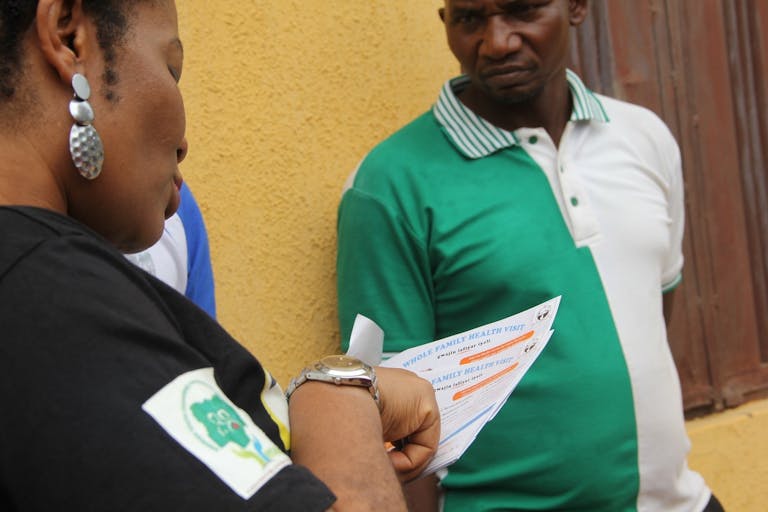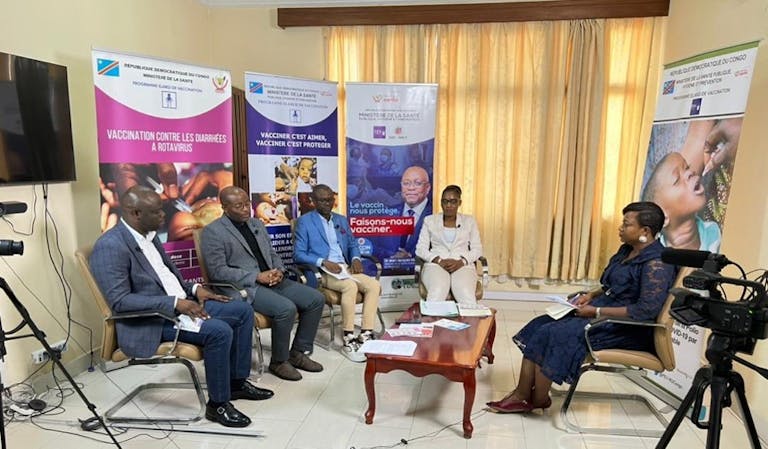Last updated April 13, 2023
Written by: Elizabeth Thrush, Senior Officer for Polio and Immunization Advocacy, United Nations Foundation
Download the report in English – Télécharger le rapport en français
According to the United Nations, a civil society organization (CSO) is any non-profit, voluntary citizens’ group which is organized on a local, national, or international level. CSOs have a vital role to play in the control of infectious diseases. Some CSOs play an advocacy role to sustain commitments of governments, communities, and donors, some support implementation of program activities, and some do both.
The UN Foundation’s new report, “Leveraging CSO Contributions to Advance Polio Transition and Integration Efforts in the African Region” outlines specific areas where CSO support can be of value for polio transition and integration. In particular, this report describes the initiatives implemented by four CSOs supported by the UN Foundation to enhance polio transition and integration efforts in the Democratic Republic of the Congo (DRC), Ethiopia, Nigeria, and South Sudan.

The African region was declared free of wild poliovirus (WPV) in August 2020. This incredible achievement was a result of decades of work by a coalition of international health bodies, national and local governments, civil society and community volunteers. Notwithstanding this significant milestone, the African Region is still experiencing outbreaks of the non-wild variant of poliovirus, known as circulating vaccine-derived poliovirus (cVDPV) in 25 countries. Furthermore, in 2022, WPV importations were reported in two countries that had been polio-free for over three decades, Malawi and Mozambique. These detections highlight that until all forms of polio are eradicated everywhere, the risk of importation remains a constant threat. This further emphasizes the importance of maintaining the Global Polio Eradication Initiative (GPEI) infrastructure in order to both achieve and maintain a polio-free world.

Over the past three decades, the GPEI has built significant health system infrastructure and staff capacity to support not only polio eradication but also several related public health efforts.
“Polio transition” is the opportunity to sustain, and where needed, repurpose the network and infrastructure setup to eradicate polio in order to strengthen broader health priorities, especially immunization, disease detection, and emergency preparedness and response. Similarly, “polio integration” is, wherever possible, taking advantage of shared infrastructure and creating programmatic synergies to improve impact. Integration is an important piece of WHO’s 13th General Program of Work (GPW13) and a strategic priority of Immunization Agenda 2030 and Gavi 5.0.
Governments have been tasked with developing national polio transition plans. Preparing and implementing these plans provides the opportunity to sustain this infrastructure to strengthen health systems, bolster global health security and make progress towards broader health goals.
The World Health Organization (WHO) and UNICEF have been supporting this process at country level as well as working towards ensuring effective integration and transition within their internal agencies. However, this is no small task and there are many challenges standing in the way of success, including continued circulation of WPV and cVDPV, the ongoing COVID-19 global pandemic, and other competing health priorities. This effort is made even harder in areas experiencing conflict and civil unrest. Successful polio transition and integration will require collaboration from all actors, including GPEI partner agencies, governments, communities, and civil society.

From 2021-2022, the UN Foundation provided support to four African CSOs in priority countries to implement advocacy interventions to enhance national polio transition and integration efforts: the Consortium of Christian Relief and Development Associations (CCRDA), which is part of the CORE Group Polio Project, in Ethiopia; Impact Health Organization (IHO) in South Sudan; Vaccine Network for Disease Control (VNDC) in Nigeria; and VillageReach in DRC.
All four organizations were able to make impactful contributions to polio transition and integration efforts in their respective countries, despite varying country contexts and significant challenges. These contributions helped elevate awareness and the sense of urgency for polio transition among key stakeholders, promote domestic allocation of funds for immunization and polio, and integrate polio control in other health services.
In Ethiopia, CCRDA helped elevate awareness and sense of urgency for polio transition. At the start of CCRDA’s project, government authorities were dealing with the COVID-19 pandemic response, as well as facing war and instability, and dealing with an outbreak of cVDPV, which left very little time for polio integration and transition planning. However, after a series of advocacy activities and meetings convened by CCRDA with government officials and UN partners, polio transition planning activities were given increased attention by key stakeholders. Through elevating these issues to the highest levels, CCRDA was able to help Ethiopia establish a Polio Transition Task Team, finalize the updated national polio transition plan (2022-2025), and establish and train subnational level teams to coordinate polio integration and transition activities at localized levels.
In DRC, VillageReach made a significant impact on the domestic allocation of funds by reaching out to national and sub-national parliamentarians to build their awareness of the importance of polio transition and the role that parliamentarians have in helping to secure domestic funding. VillageReach also utilized their networks to build more pressure for local governments to allocate budget lines to polio and immunization. They trained representatives from 18 other CSOs and journalists across three provinces, Equateur, Kinshasa, and Kwilu, to support advocacy efforts. One key result of this effort was the development of a provincial edict for Kinshasa, which is still under review, that would secure annual budgeting for immunization and polio eradication activities at the provincial level.
In South Sudan, IHO also helped elevate awareness and sense of urgency for polio transition and advocate for domestic financing. At the start of IHO’s project, the South Sudan polio transition plan, drafted in 2017, had not yet been updated and no funds had been allocated by the government for its implementation. IHO created a network of CSOs to build pressure on the government to prioritize this issue. They convened meetings with government authorities and key polio partners and supported the country to extend the current plan and discuss the need to advocate for more government funding for polio and immunization.
In Nigeria, VNDC was instrumental in integrating polio into other health services. VNDC pilot tested the Whole Family Approach (WFA) program in selected Primary Health Care (PHC) centers in Nigeria. They developed a scorecard to gauge the level of preparedness of health facilities for the effective integration of polio vaccination and routine immunization with COVID-19 vaccination. They also trained six local women-owned CSOs to strengthen community awareness and demand for WFA.

Polio transition and integration needs to happen at the country level and serve the needs of populations. Success will require all health system actors, governments, WHO and UNICEF, communities, and civil society to work together at national and sub-national levels to clarify roles, share information, implement action, track progress, confront challenges, and agree on a vision for the future.
CSOs can provide polio transition and integration support in the following areas:
The following CSO qualities make them invaluable partners in this process:
CSOs are not homogenous and have varying capabilities and mandates. Some CSOs play a pure advocacy role, some implement program activities, and some do both. Therefore, specific CSO collaboration for polio transition and integration needs to be tailored to organizations’ individual strengths.
Many CSOs are already working on issues related to the goals of polio integration and transition, such as immunization strengthening, surveillance, and outbreak response. However, some are not yet specifically aware of polio transition and integration goals. With targeted involvement and capacity building, more CSOs could be equipped to support these efforts at national and subnational levels.
In order to harness the full potential of civil society for these issues, they need to be included in the whole process of eradication, integration, and transition. This requires commitment of global health leaders and governments to continue to work with local CSOs and leverage the strengths they bring to ensure implementation of national polio transition action plans.
The full UN Foundation report includes recommendations for three stakeholder groups: governments and WHO and UNICEF country offices in polio transition countries; civil society organizations; and global and regional partners.
Download Full Report in English · Download Executive Summary in English
Télécharger le Rapport en Français
Watch “The Road to a Polio-Free Future: Integration and Transition of Polio Experiences and Assets in Ethiopia.” Produced by the Consortium of Christian Relief and Development Association (CCRDA) and the CORE Group Polio Project (CGPP) in Ethiopia, this 15-minute documentary explores the process of integration and transition of polio experiences and assets in Ethiopia. Through insightful interviews and visuals, viewers witness the progress made so far and the challenges that lie ahead.
Elizabeth Thrush is the Senior Officer for Polio and Immunization Advocacy on the Global Health team at the United Nations Foundation. In this role, she provides advocacy support for UN Foundation’s polio and broader immunization portfolios. Prior to joining the UN Foundation, Elizabeth worked on the immunization team at the Pan American Health Organization, Regional Office for the Americas of the World Health Organization (PAHO/WHO), providing support for the countries of the Americas on immunization and surveillance activities for polio and other vaccine preventable diseases. Elizabeth holds a Master of Public Health (MPH) degree focused on global health and behavior change communication from The George Washington University.
To get the latest Global Health news from experts like Elizabeth, subscribe to our monthly newsletter.